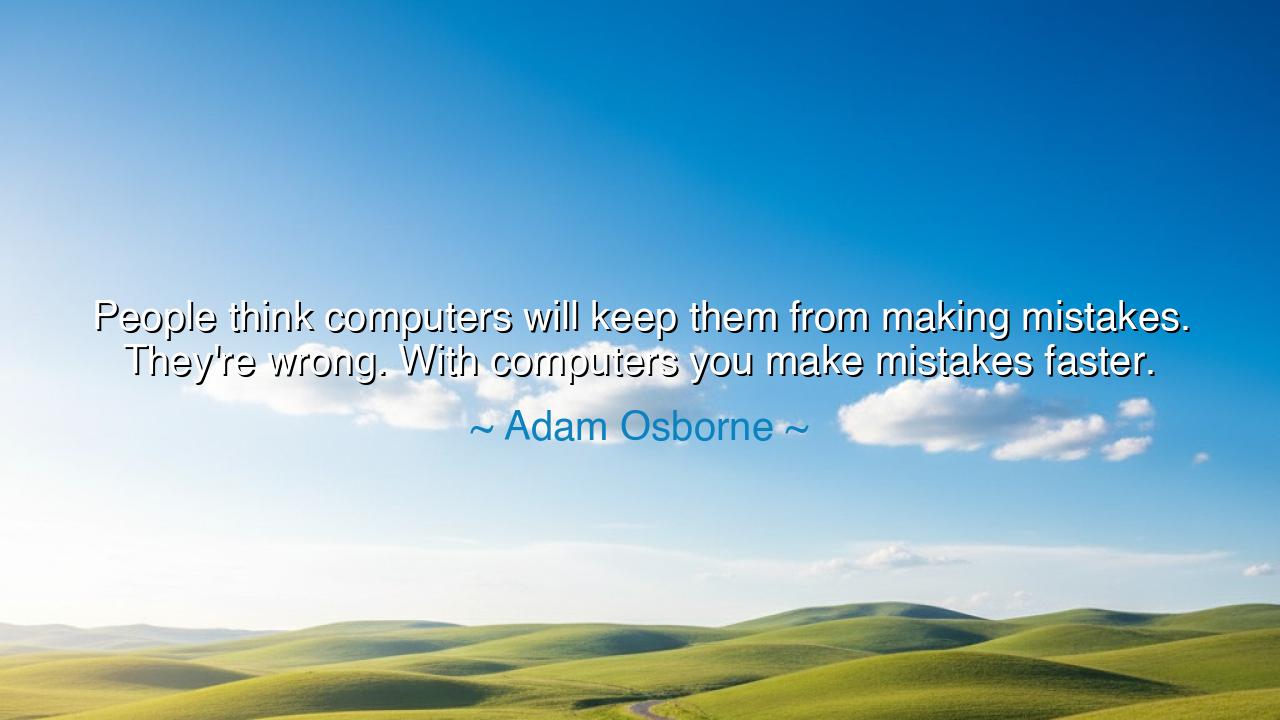
People think computers will keep them from making mistakes.
People think computers will keep them from making mistakes. They're wrong. With computers you make mistakes faster.






In the ancient halls of wisdom, there were scholars who warned that the tools we create are not just extensions of our power but reflections of our flaws. Just as the sword, in the hands of a reckless warrior, can lead to destruction, so too can the tools of the mind, like the computer, become instruments of folly when not wielded with care. The great thinker Adam Osborne, whose insight into the rise of the digital age was prophetic, once said, "People think computers will keep them from making mistakes. They're wrong. With computers you make mistakes faster." His words, though spoken in the context of a world still coming to grips with the dawn of personal computing, carry within them a timeless truth—the tools we create do not absolve us of our responsibility.
When Osborne spoke of the rapid pace at which we make mistakes with computers, he was tapping into a profound human truth. It is not the tool that determines the outcome but the hand that guides it. Computers, for all their speed and precision, cannot replace the human mind. They may assist in our calculations, help us navigate vast seas of information, or speed our processes, but they are still subject to the choices we make. In fact, as Osborne suggested, they can magnify our mistakes, making them faster, more frequent, and often more consequential. Mistakes made in the heat of human error can now ripple through systems and processes with alarming swiftness, multiplying with a speed that was once unimaginable.
Consider the ancient craftsmen who worked with their hands, carefully shaping their creations from stone, wood, and metal. Every mistake they made was felt in the slow, deliberate shaping of their work. There was time for reflection, for correction, and for learning from their missteps. The art of craftsmanship was built on the slow, patient accumulation of knowledge. The journey was long, but the lessons were deep. Today, however, in the age of computing, the lessons are not always so easily learned. A single click, a misstep, and the mistake is not only made but rapidly magnified and sent across a vast digital landscape. The human element becomes lost in the blur of information, and the time for reflection is often replaced by a frantic rush to undo the damage.
This shift is not unlike the story of Icarus, the young man who flew too close to the sun, driven by his ambition and the technology of wings crafted by his father. In his desire to soar higher, Icarus ignored the warnings of moderation. The wings, which were meant to carry him to greatness, led instead to his downfall. So too do the tools of today, including the computer, if not used with caution. The speed they provide can lure us into overconfidence, making us believe that we can control everything. But just as Icarus’s overconfidence led to his fall, so too can the haste encouraged by technology lead to errors that spiral out of control.
Osborne’s warning, then, is one of great wisdom: the computer does not shield us from mistakes; it accelerates them. Speed, in this age, has become a double-edged sword. We are given the ability to act faster, but we are not given the wisdom to act better. The more we depend on the computer to navigate our world, the more we risk losing the patience and thoughtfulness that once allowed us to learn from our mistakes. We must reclaim our responsibility for the choices we make and not hide behind the illusion that technology can absolve us from the consequences of our actions.
The lesson, then, is one of balance. The computer is a powerful tool, yes, but it is only a tool. We must continue to develop our critical thinking, our ability to reflect, and our patience in decision-making. We must use the speed of the computer not as a crutch but as an enhancement, a way to extend our abilities, but never as a substitute for wisdom. Just as the ancient philosophers spent their days contemplating, examining, and refining their ideas, so too must we take the time to reflect before we act, regardless of how quickly our tools can allow us to move.
The practical actions we must take, then, are clear. Let us not be seduced by the speed of the digital age, for quickness is not the same as correctness. We must slow ourselves down, take the time to think, and use technology not as a means of rushing but as a means of improving the quality of our decisions. Wisdom does not come from speed, and in the haste to reach the end, we may lose the path that leads us there. Just as the great craftsmen of old took time to perfect their art, so must we, in this age of technology, take time to perfect the decisions we make. For only when we use our tools with care and reflection will we avoid the rapid mistakes Osborne warned us of, and in doing so, we will craft a future that is both wise and prosperous.






AAdministratorAdministrator
Welcome, honored guests. Please leave a comment, we will respond soon